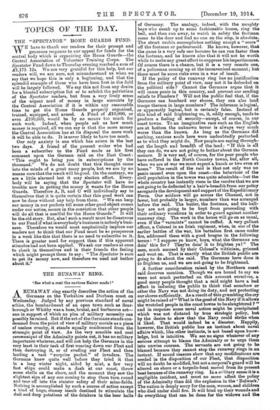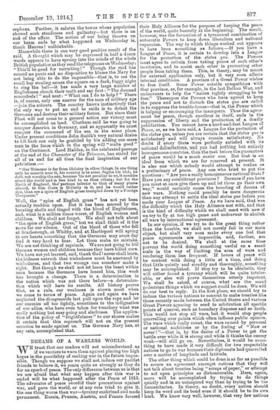THE RUNAWAY RING.
See what a rent the envious Kaiser made !'
ARUNAWAY ring exactly describes the action of the Germans on the Yorkshire and Durham coast on Wednesday. Judged by any previous standard of naval ethics, the bombardment of an open town such as Scar- borough or Whitby was a base, brutal, and barbarous act— one in support of which no plea of military necessity can possibly be raised. But if the act of the Germans stands con- demned from the point of view of military morals as a piece of useless cruelty, it stands equally condemned from the strategic point of view. As the very sensible and cool communiqué of the Admiralty points out, it has no military importance whatever, and will not help the Germans in the very least in their task of first wearing down our Fleet and then destroying it, or of evading our Fleet and then landing a vast " surprise packet " of invaders. The Germans knew quite well before they tried it that in a long winter night, aided by mist, a few very fast ships could make a dash at our coast, throw some shells on the shore, and the moment they saw the slightest sign of any one coming to stop them turn round and tear off into the sinister safety of their mine-fields. Nothing is accomplished by such a course of action except a kind of huge, clumsy insult destined to stimulate the dull and deep potations of the drinkers in the beer halls of Germany. The analogy, indeed, with the naughty boys who sneak up to some fashionable house, ring the bell, and then run away, to watch in safety the footman come to the door and find no one on the step, is absolute. The street urchin accomplishes nothing except a "score" off the footman or parlourmaid. He knows, however, that the game is a very safe one because he can run faster than the footman, and he knows also that it will not be worth while to make any great effort to suppress his impertinences. Of course there is a chance, but it is a very remote one, of a policeman coming up at the inconvenient moment ; but there must be some risks even in a war of insult.
If the policy of the runaway ring has no justification from the military point of view, may not it be defended on the political side ? Cannot the Germans argue that it will cause panic in this country, and prevent our sending reliefs to Flanders ? Will not the public feel that, if the Germans can bombard our shores, they can also land troops thereon in large numbers ? The inference is logical, or apparently logical, but is certainly false. Instead of this kind of raid frightening us, it, oddly enough, tends to produce a feeling of security—except, of course, in our coast towns. To an imaginative race such as the English are at bottom the unknown terror is always very much worse than the known. As long as the Germans did nothing, anxious souls here were undoubtedly perturbed as to what they might do. Now people are saying through- out the length and breadth of the land " If this is all they can do, we are not going to bother about the German menace. It is very sad, of course, for the poor people who have suffered in the North Country towns, but, after all, when we are at war we must expect a knock or two even at home." The result of the raid is that not only was no panic caused even upon the coast—the behaviour of the civil population in the towns was quite admirable—but the whole country has instantly risen to the resolve that we are not going to be deflected by a hair's-breadth from our policy as regards the development and support of the Expeditionary Force. Our soldiers will go across the Channel, not in fewer, but probably in larger, numbers than was arranged before the raid. The butler, the footman, and the hall- boy are not going to be kept from proceeding with their ordinary vocations in order to guard against another runaway ring. The work in the house will go on as usual, even if the " varmints " cannot be cuffed. A very gallant officer, a Colonel in an Irish regiment, when, in one of the earlier battles of the war, his battalion first came under fire, addressed them with a good brogue in the following terms : " I suppose ye know, boys, what the Germans are doin' this for F They're doin' it to frighten ye ! " The men, much amused by their Colonel's witticism, grinned and went on. That is exactly what the British public are going to do about the raid. The Germans have done it to frighten us, and we are not going to be frightened.
A further consideration raised by the Northern coast raid deserves mention. Though we are bound to say we were not much perturbed on this account ourselves, a good many people thought that a raid might have a bad effect in inducing the public to think that somehow or other the Navy was not doing its duty, and not protecting our shores sufficiently. As a result of this grumbling the cry might be raised of " What is the good of the Navy if it allows the wretched people in the coast towns to be slaughtered ? " and in response some naval action might be precipitated which was not dictated by true strategic policy, but by the desire to show that the Navy could strike when it liked. That would indeed be a disaster. Happily, however, the British public has an instinct about naval affairs which, like other instincts, is not based upon know- ledge, but is intuitive. We see no signs whatever of any serious attempt to blame the Admiralty or to urge them into unwise courses. The servants are not going to be blamed because they cannot stop the runaway rings in an instant. If sound reasons show that any modifications are needed in the disposition of our Fleet, that disposition will no doubt be modified, but not a corporal's guard will be altered on shore or a torpedo-boat moved from its present beat because of the runaway ring. In a te;litary sense it is a negligible incident, and must no more affect the policy of the Admiralty than did the explosion in the ' Bulwark.' The nation is deeply sorry for the men, women, and children who died under shell fire. It will bind up their wounds and do everything that can be done for the widows and the orphans. Further, it salutes the towns whose population showed such steadiness and gallantry—but there is an end of the affair. The notion of our being thrown on our beam ends by what happened on Wednesday is, thank Heaven ! unthinkable.
Meanwhile there is one very good positive result of the raid. A thought which may be expressed in half a. dozen words appears to have sprung into the minds of the whole British population as they read the telegrams on Wednesday: " This'll be good for recruiting !" Though the raid. has caused no panic and no disposition to blame the Navy for not being able to do the impossible—that is, to see the small boy stealing across the square on a dark, foggy night to ring the bell—it has made a very large number of Englishmen clench their teeth and say first : " The damned scoundrels ! " and next: " What can I do to help ? " There is, of course, only one answer for the man of military age —join the colours. The country knows instinctively that the only way to put an end to raids is to defeat the Germans and destroy their military forces. But since their Fleet will not come to a general action our victory must be accomplished on land. Chatham said he was going to conquer America in Germany, and so apparently we must conquer the command of the sea in the same place. Under present conditions John Smith's very natural desire to hit back can only be gratified by his adding one more man to the force which in the spring will " make good " on the Continent. Lord Halifax, in the celebrated passage at the end of the Character of the Trimmer, has stated for all of us and for all time the final inspiration of our patriotism :- " Our Trimmer is far from idolatry in other things, in one thing only he cometh near it, his country is in some degree his idol ; he Both not worship the sun, because 'tis not peculiar to us, it rambles about the world and is less kind to us than others ; but for the Earth of England, tho' perhaps inferior to that of many places abroad, to him there is Divinity in it, and he would rather dye, than see a spire of English grass trampled down by a Foreign Trespasser."
Won, the " spire of English grass " has not yet been actually trodden upon. But it has been marred by the bursting shells and tinged with the blood of Englishmen, and, what is a million times worse, of English women and children. We shall not forget. We shall not talk about " the spire of English grass," but we shall think of it the more for our silence. Out of the blood of those who fell at Scarborough, at Whitby, and at Hartlepool will spring in our hearts something that the Germans may some day find it very hard to bear. Let them make no mistake. We are not thinking of reprisals. We are not going to kill German women and children because they have killed ours. We have not yet learned, and, thank God ! never shall learn, the hideous untruth that wickedness must be answered by wickedness, and that two wrongs can somehow make a right. But though we shall not let loose the beast within man because the Germans have loosed him, this week has brought a change. There is a determination in the nation which was not there before—a determina- tion which will have its results. All history proves that, as a rule, our weakness is shown most when we come to terms of peace. Again and again we have neglected the disagreeable last pull upon the rope and let our enemies off too lightly, sometimes to the indignation of our allies, who have even taken for treachery what was really nothing but easy going and slackness. The applica- tion of the policy of "frightfulness " to our shores makes it certain that this reproach will not on the present occasion be made against us. The German Navy has, at any rate, accomplished that.







































 Previous page
Previous page